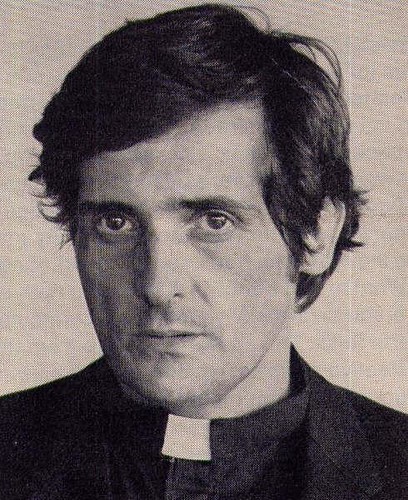Copyright 2020 by Gary L. Pullman
Once
upon a midnight dreary, while I pondered, weak and weary,
Over
many a quaint and curious volume of forgotten lore--
While
I nodded, nearly napping, suddenly there came a tapping,
As
of some one gently rapping, rapping at my chamber door.
"'Tis
some visitor," I muttered, "tapping at my chamber door--
Only
this and nothing more."
Ah,
distinctly I remember it was in the bleak December;
And
each separate dying ember wrought its ghost upon the floor.
Eagerly
I wished the morrow; --vainly I had sought to borrow
From
my books surcease of sorrow--sorrow for the lost Lenore--
For
the rare and radiant maiden whom the angels name Lenore--
Nameless
here for evermore.
And
the silken, sad, uncertain rustling of each purple curtain
Thrilled
me--filled me with fantastic terrors never felt before;
So
that now, to still the beating of my heart, I stood repeating
"'Tis
some visitor entreating entrance at my chamber door--
Some
late visitor entreating entrance at my chamber door; --
This
it is and nothing more."
Presently
my soul grew stronger; hesitating then no longer,
"Sir,"
said I, "or Madam, truly your forgiveness I implore;
But
the fact is I was napping, and so gently you came rapping,
And
so faintly you came tapping, tapping at my chamber door,
That
I scarce was sure I heard you" -- here I opened wide the door;
--
Darkness
there and nothing more.
Deep
into that darkness peering, long I stood there wondering, fearing,
Doubting,
dreaming dreams no mortal ever dared to dream before;
But
the silence was unbroken, and the stillness gave no token,
And
the only word there spoken was the whispered word "Lenore!"
This
I whispered, and an echo murmured back the word "Lenore!"
Merely
this and nothing more.
Back
into the chamber turning, all my soul within me burning,
Soon
again I heard a tapping somewhat louder than before.
"Surely,"
said I, "surely that is something at my window lattice
Let
me see, then, what thereat is, and this mystery explore--
Let
my heart be still a moment and this mystery explore; --
"'Tis
the wind and nothing more!"
Open
here I flung the shutter, When, with many a flirt and flutter
In
there stepped a stately Raven of the Saintly days of yore.
Not
the least obeisance made he; not a minute stopped or stayed he;
But,
with mein of lord or lady, perched above my chamber door--
Perched
upon my bust of Pallas just above my chamber door--
Perched,
and sat, and nothing more.
Then
this ebony bird beguiling my sad fancy into smiling,
By
the grave and stern decorum of the countenance it wore,
"Though
thy crest be shorn and shaven, thou," I said, "art sure no
craven,
Ghastly
grim and ancient Raven wandering from the Nightly shore--
Tell
me what thy lordly name is on the Night's Plutonian shore!"
Quoth
the Raven, "Nevermore."
Much
I marvelled this ungainly fowl to hear discourse so plainly,
Though
its answer little meaning-- little relevancy bore;
For
we cannot help agreeing that no living human being
Ever
yet was blessed with seeing bird above his chamber door--
Bird
or beast upon the sculptured bust above his chamber door,
With
such name as "Nevermore."
But
the Raven, sitting lonely on the placid bust, spoke only
That
one word, as if his soul in that one word he did outpour.
Nothing
farther then he uttered--not a feather then he fluttered--
Till
I scarcely more than muttered "Other friends have flown before--
On
the morrow he will leave me, as my hopes have flown before."
Then
the bird said "Nevermore."
Startled
at the stillness broken by reply so aptly spoken,
"Doubtless,"
said I, "what it utters is its only stock and store
Caught
from some unhappy master whom unmerciful Disaster
Followed
fast and followed faster till his songs one burden bore--
Till
the dirges of his Hope that melancholy burden bore
Of
'Never--nevermore.'"
But
the Raven still beguiling all my sad soul into smiling
Straight
I wheeled a cushioned seat in front of bird, and bust and door;
Then,
upon the velvet sinking, I betook myself to linking
Fancy
unto fancy, thinking what this ominous bird of yore--
What
this grim, ungainly, ghastly, gaunt, and ominous bird of yore
meant
in croaking "Nevermore."
This
I sat engaged in guessing, but no syllable expressing
To
the fowl whose fiery eyes now burned into my bosom's core;
This
and more I sat divining, with my head at ease reclining
On
the cushion's velvet lining that the lamp-light gloated o'er,
But
whose velvet violet lining with the lamp-light gloating o'er,
She
shall press, ah, nevermore!
Then,
methought, the air grew denser, perfumed from an unseen censer
Swung
by Seraphim whose foot-falls tinkled on the tufted floor.
"Wretch,"
I cried, "Thy God hath lent thee--by these angels he hath sent
thee
Respite--respite
and nepenthe from thy memories of Lenore,
Quaff,
oh quaff this kind nepenthe and forget this lost Lenore!"
Quoth
the Raven "Nevermore."
"Prophet!"
said I, "thing of evil! prophet still, if bird or devil!--
Whether
Tempest sent, or whether tempest tossed thee here ashore,
Desolate
yet all undaunted, on this desert land enchanted--
On
this home by Horror haunted--tell me truly, I implore--
Is
there-- is there balm in Gilead?-- tell me-- tell me, I implore!"
Quoth
the Raven "Nevermore."
"Prophet!"
said I, "thing of evil! - prophet still, if bird or devil!
By
that Heaven that bends above us - by that God we both adore --
Tell
this soul with sorrow laden if, within the distant Aidenn,
It
shall clasp a sainted maiden whom the angels name Lenore --
Clasp
a rare and radiant maiden whom the angels name Lenore."
Quoth
the Raven "Nevermore."
"Be
that word our sign of parting, bird or fiend!" I shrieked,
upstarting--
"Get
thee back into the tempest and the Night's Plutonian shore!
Leave
no black plume as a token of that lie thy soul hath spoken!
Leave
my loneliness unbroken! --quit the bust above my door!
Take
thy beak from out my heart, and Take thy form from off my door!"
Quoth
the Raven "Nevermore."
And
the Raven, never flitting, still is sitting, still is sitting
On
the pallid bust of Pallas just above my chamber door;
And
his eyes have all the seeming of a demon's that is dreaming,
And
the lamp-light o'er him streaming throws his shadow on the floor;
And
my soul from out that shadow that lies floating on the floor
Shall
be lifted--nevermore!
The
opening stanza of this celebrated poem sets the tone, suggests that
the narrator, or speaker, is uneasy about something; establishes the
mood as a somber, gloomy one; and, of course, presents the rhyme
scheme, which is both complex and calculatingly hypnotic:
Once
upon a midnight dreary, while I pondered, weak and weary,
Over
many a quaint and curious volume of forgotten lore--
While
I nodded, nearly napping, suddenly there came a tapping,
As
of some one gently rapping, rapping at my chamber door.
"'Tis
some visitor," I muttered, "tapping at my chamber door--
Only
this and nothing more."
The
speaker tells us that he was half-asleep, after poring over “many a
quaint and curious volume of forgotten lore,” such as, today, one
might find, perhaps, in the New Age section of a bookstore--books on
the occult, otherworldly, and paranormal. The adjectives, coupled
with the poem’s internal and end-rhymes and the repetition of
certain images and ideas (especially the phrase “nothing more“),
creates a sense of gloom that is pervasive throughout the initial
poem, as the same technique, employed in the following stanzas will
prove to be throughout the rest of the work.
In
this first stanza, the knock at the door seems “gentle,” and the
speaker supposes that it signifies “some visitor,” “only this
and nothing more.” His supposition seems reasonable, but it does
introduce the question as to why he might thing that it could be
anything more than merely “some visitor”? (It is important to
observe that the speaker not only asks the questions that are posed
buy that he also answers them; both the questions and the answers to
them are his own.) What else does he, perhaps, suppose the tapping,
rapping at the door might signify and why? With this seemingly
innocent, casual comment on the speaker’s part, especially
considering that the hour is midnight--the so-called witches’
hour--and that he has been studying “many a quaint and curious
volume of forgotten lore,“ an air of mystery and a hint of the
malevolent enter the poem, which will become more and more
pronounced.

In
the next stanza, Poe, through the speaker, sets the scene, informing
the reader that it was--and here’s another gloomy adjective “in
the bleak December,” which is to say, the winter of the year, a
season often associated with death. He reinforces the idea of death
by using terms and images associated with it. Each coal in the
fireplace is a “dying ember,” which is reflected upon the floor
as if it were a “ghost.” It is obvious that death is much on the
speaker’s mind--so much so, in fact, that he includes images of
death in the description even of so mundane a phenomenon as a fire
smoldering in his fireplace. The death of the fire is a slow one; the
speaker marks the death of “each separate dying ember.” It is as
if the fire represents the slow dying of his own hope or faith as
well as his own sanity, which becomes more and more discernable as
the poem progresses. He also tells the reader the motive for his
having burned the midnight oil, poring over these “many a quaint
and curious volume of forgotten lore.” He was hoping to ease his
grief at having suffered the death of his beautiful, beloved, whom he
describes as “the rare and radiant maiden whom the angels name
Lenore,” whom he recognizes is gone from his presence for ever,
“nameless here for evermore.” He does not seek solace from his
grief by reading the Bible or some other religious holy book, it
should be observed; rather, he has sought to find “surcease of
sorrow” in the study of “many a quaint and curious volume of
forgotten lore”:
Ah,
distinctly I remember it was in the bleak December;
And
each separate dying ember wrought its ghost upon the floor.
Eagerly
I wished the morrow; --vainly I had sought to borrow
From
my books surcease of sorrow--sorrow for the lost Lenore--
For
the rare and radiant maiden whom the angels name Lenore--
Nameless
here for evermore.
So
absorbed has the narrator been with his grief that, upon awakening to
the tapping at his door, he is startled by the rustling of the
curtains. The adjectives that he uses to describe the curtains’
rustling are those which he chooses; as such, they tell us about his
own mental state, since, obviously cloth cannot experience
emotions--it is he who feels and (using a Freudian term) projects his
feelings onto the curtain, characterizing them as “sad” and
“uncertain,” just as, earlier, he described the smoldering coals
of his fire as “dying embers,” each of which reflected its
“ghosts upon the floor.” The speaker’s word choice, as
demonstrated in the adjectives that he uses in descriptions of the
mundane objects and phenomena in his environment, together with his
personifications of those objects and phenomena, do more to
characterize him, showing his thoughts and feelings, than they do
anything else. It is he who feels himself to be dying, not the fire,
and it is he feels sad and uncertain, not the rustling curtains. The
reader must wonder why the mere rustling of curtains should “thrill”
the speaker, filling him with “fantastic terrors never felt before”
and make himself stand, repeating, over and over, “"'Tis some
visitor entreating entrance at my chamber door--/ Some late visitor
entreating entrance at my chamber door; --/ This it is and nothing
more,” as if to convince himself of the truth of this explanation
of the rustling curtains. The reader is apt, at this point, to wonder
about the narrator. At best, he seems unduly frightened and worried;
at worst, he seems to have a questionable grip on his sanity.

The
effect of his repeating to himself that it is only “some visitor
entreating entrance at my chamber door” seems to calm him, as he
says that “presently my soul grew stronger,” and he is able to
end his hesitation about answering his visitor’s knock, although
the hesitant manner in which he finally does answer, begging his
visitor’s forgiveness and explaining why he is late in answering
the knock, indicates that he remains frightened and apprehensive.
When he finally does open the door, he sees “darkness there and
nothing more.” The reader can imagine his shock and terror at
finding no visitor there. He has told himself, again and again, that
the tapping and rapping at his door and the rustling of the curtains
at his windows have a simple, natural explanation and portend nothing
more than the appearance of “some visitor.” Now, faced with
“darkness . . . and nothing more,” that theory has been shown to
be wrong.
His
fear, as the next stanza shows, increases immensely as a result, and
he next hypothesizes that the cause of the sounds he’s heard may be
supernatural or otherworldly; he suspects that his “visitor” may
have been the dead Lenore! However, when he goes back into his room
and hears a louder tapping than that which he has heard before, this
time coming from his window lattice, he attributes the sound to the
effect of the wind. To explain the sounds that he hears, the speaker
alternates between attributing the cause of those sounds to the
supernatural or otherworldly and to the natural and mundane. He also
seems to recognize that he is in an excited, frightened state of
mind, because he tells himself, “Let my heart be still a moment and
this mystery explore; --‘Tis the wind and nothing more!’”
The
speaker’s state of mind is conveyed by his behavior as much as by
his speech. Now, he throws open the shutter to his window, as if to
take by surprise whatever thing, natural or monstrous, that may wait
outside his room, thereupon meeting the raven. The speaker
personifies the bird, just as he has the fire and the curtains. It is
a noble bird, which makes “not the least obeisance. . . but, with
mein of lord or lady,” takes up its perch above the speaker’s
door, as if the speaker’s room were its own and the speaker, rather
than the bird, were the master of the house:
Open
here I flung the shutter, When, with many a flirt and flutter
In
there stepped a stately Raven of the Saintly days of yore.
Not
the least obeisance made he; not a minute stopped or stayed he;
But,
with mein of lord or lady, perched above my chamber door--
Perched
upon my bust of Pallas just above my chamber door--
Perched,
and sat, and nothing more.
The
speaker is first amused by the solemnity of the “stately
Raven”--notice the capital “R”; this is no mere raven, but The
Raven--a god in avian plumage--but his amusement soon gives way to
dread as he imagines that this “grim and ancient Raven” is a
representative from the land of the dead, a lord from “the Night’s
Plutonian shore.” Again, these are the speaker’s own thoughts. He
continues to personify the bird that has entered his chamber,
attributing not merely human but divine attributes to the bird,
seeing it as an emissary of the dead, as a messenger sent, perhaps,
by the Roman god of the dead, Pluto, himself.
When
the anxious speaker asks the bird to tell him what it is called in
the land of the dead, the bird answers, “Nevermore.” The reply
seems to put the speaker’s fears to rest, for he muses upon the
notion of a bird that can seemingly talk but whose reply is but a
meaningless absurdity. Again, the speaker vacillates, hesitantly,
back and forth between rational thought and mad imaginings:
Much
I marvelled this ungainly fowl to hear discourse so plainly,
Though
its answer little meaning-- little relevancy bore;
For
we cannot help agreeing that no living human being
Ever
yet was blessed with seeing bird above his chamber door--
Bird
or beast upon the sculptured bust above his chamber door,
With
such name as "Nevermore."
The
speaker is quick to note that the bird’s vocabulary seems to
consist of but this one word: “But the Raven, sitting lonely on the
placid bust, spoke only/ That one word, as if his soul in that one
word he did outpour.” Although, in response to the speaker’s
question, the raven’s reply had borne “little relevancy,” it is
interesting to note that the same response soon will come to have
greater and greater significance for the speaker (who, after all,
frames the questions to which the same reply is always to be made).
Indeed, this single-word answer to his questions will come to terrify
him, intensifying his despair of ever again seeing his “lost
Lenore.”
The
reader should remember, throughout the reading of the poem, that the
raven answers always with the same word; it is the speaker who must
frame the questions so that the bird’s response appears to be
significant and appears, it might be added, to reinforce the
speaker’s own preconceptions about the what, if anything, follows
death. Only in the speaker’s mind is the raven The Raven, because
it is he who poses questions to which “nevermore” may be regarded
as being a significant response. As the speaker himself confesses, it
is he who ponders possible meanings for the bird’s “croaking
‘Nevermore’”:
.
. . Straight I wheeled a cushioned seat in front of bird, and bust
and door;
Then,
upon the velvet sinking, I betook myself to linking
Fancy
unto fancy, thinking what this ominous bird of yore--
What
this grim, ungainly, ghastly, gaunt, and ominous bird of yore
meant
in croaking "Nevermore."
The
speaker, at first, cannot discern whether the raven is sent from God
or from the devil, whether it is a messenger from heaven or from
hell. When he asks it whether there is “balm in Gilead,” or a
salve that is capable of healing his anguished grief at Lenore’s
death, the raven replies, not surprisingly to the reader,
“Nevermore,” whereupon, not liking this answer, the speaker
believes the raven must be a bird from hell, although one that is
able to discern the future, and he asks--almost begs to know--whether
he shall ever hold Lenore in his embrace again, whether, in short,
there is a life after death, during which he and his beloved may be
reunited:
"Prophet!"
said I, "thing of evil! - prophet still, if bird or devil!
By
that Heaven that bends above us - by that God we both adore --
Tell
this soul with sorrow laden if, within the distant Aidenn,
It
shall clasp a sainted maiden whom the angels name Lenore --
Clasp
a rare and radiant maiden whom the angels name Lenore."
Quoth
the Raven "Nevermore."
Outraged
at this reply (which he contrived to be the answer by the way that he
formulated his question), the speaker orders the raven from his
chamber, but the bird ignores his command, remaining on his perch
above the door:
And
the Raven, never flitting, still is sitting, still is sitting
On
the pallid bust of Pallas just above my chamber door;
And
his eyes have all the seeming of a demon's that is dreaming,
And
the lamp-light o'er him streaming throws his shadow on the floor;
And
my soul from out that shadow that lies floating on the floor
Shall
be lifted--nevermore!
Now,
the same bird that the speaker has characterized variously as merely
an “ebony bird,” as an emissary from “the Night’s Plutonian
shore,” as a messenger sent by God or the devil, and as a demonic
prophet, now regards it as the very embodiment of wisdom, for it
occupies (not, in the mind of the narrator, by sheer chance, the
reader may assume) “the pallid bust of Pallas,” or Athena, the
goddess of wisdom.
Here,
we take our leave of the speaker, leaving him obsessed with the idea
that, in having (apparently subconsciously) answered his own
questions about the likelihood of his attaining “surcease of
sorrow” by being reunited with his “lost Lenore,“ he has
determined, just as he had believed all along, that there is no
existence beyond death, and that the proper attitude to take
concerning the belief in the survival of death is a despairing
disbelief. His “lost Lenore” was lost even before the raven
appeared to him, to reinforce his beliefs that death is the end of
life and that there is no hope in an existence beyond the grave.























